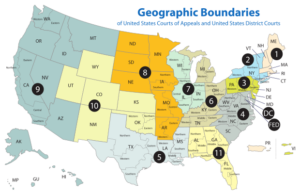The United States federal court system is a hierarchical structure consisting of three levels: the district courts, the courts of appeals, and the Supreme Court. District courts are trial-level courts who have jurisdiction over a wide range of federal cases, including criminal cases, civil cases involving federal law, and cases involving federal agencies. The courts of appeals are intermediate appellate courts, who hear appeals from the district courts and other federal agencies within their geographic jurisdiction. The Supreme Court is the highest court in the United States, and has the final say on all cases involving federal law and the United States Constitution.
 The federal court system was established by the Constitution, which gives Congress the power to create and regulate federal courts. Our first federal courts were created by the Judiciary Act of 1789, which only established district courts and the Supreme Court. The Act also created the Office of the Attorney General and provided for the appointment of federal judges by the President, with the advice and consent of the Senate.
The federal court system was established by the Constitution, which gives Congress the power to create and regulate federal courts. Our first federal courts were created by the Judiciary Act of 1789, which only established district courts and the Supreme Court. The Act also created the Office of the Attorney General and provided for the appointment of federal judges by the President, with the advice and consent of the Senate.
Over time, the federal court system has evolved and expanded to meet our country’s changing needs. The number of federal district courts and judges has increased while new courts of appeals have been established.
The First Circuit Court of Appeals is a federal appeals court with jurisdiction over the District of Maine, Massachusetts, New Hampshire, Puerto Rico, and Rhode Island. It is headquartered in Boston, Massachusetts.
Some landmark cases heard by the First Circuit Court of Appeals include:
- United States v. Enmons (1973) – establishing that union officials cannot be charged with extortion for demanding wages and benefits for their members.
- Doe v. Unocal (1997) – in which the First Circuit became the first federal court to allow claims for human rights abuses to be brought under the Alien Tort Statute.
- Doe v. Wyatt (2003) – recognizing the right of Guantanamo Bay detainees to challenge their detention in U.S. courts.
- Goodridge v. Department of Public Health (2003) – ruling that the Massachusetts ban on same-sex marriage was unconstitutional, making Massachusetts the first state in the country to legalize same-sex marriage.
These cases and others demonstrate the significant impact the First Circuit has had on the development of U.S. law.